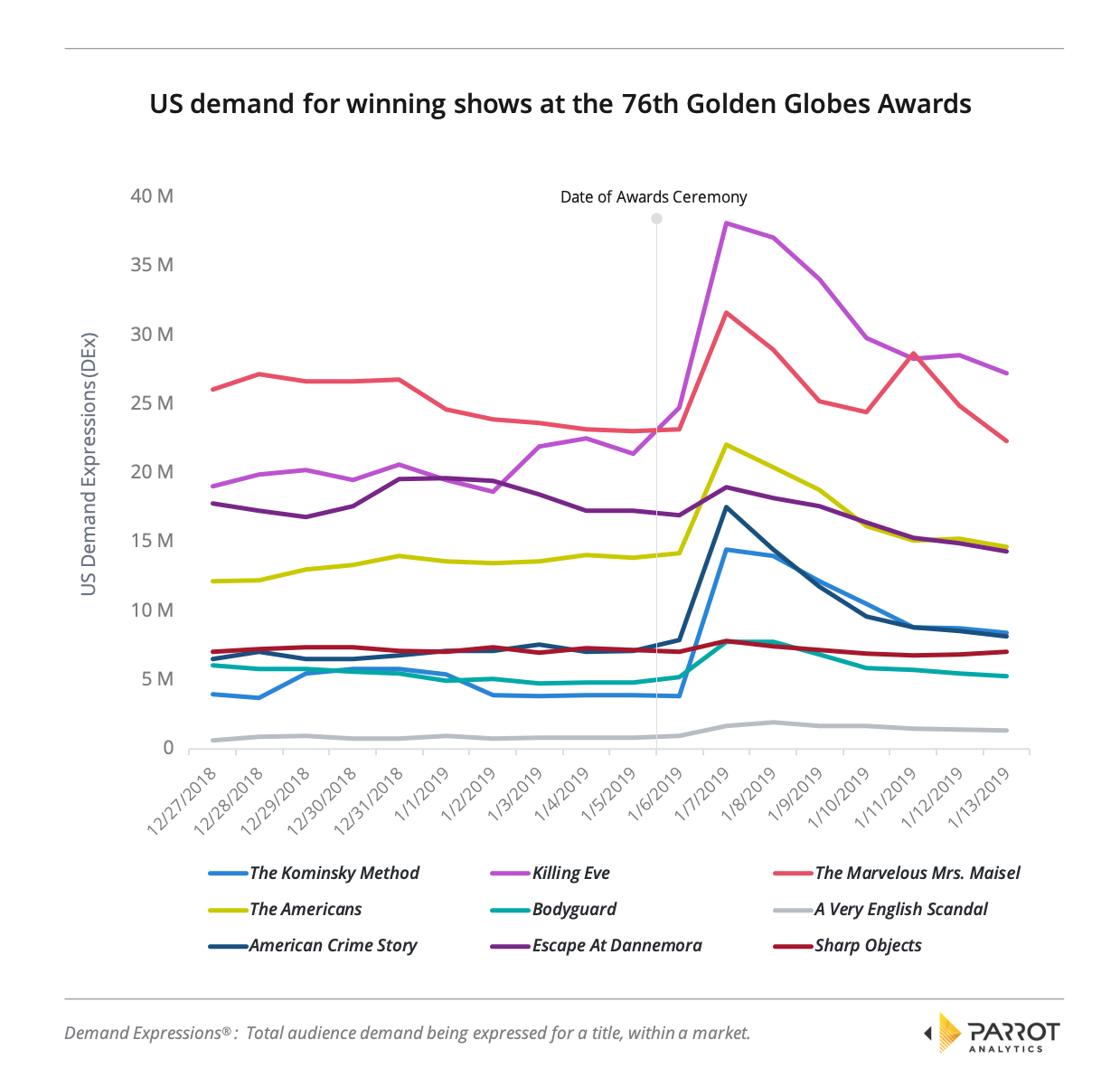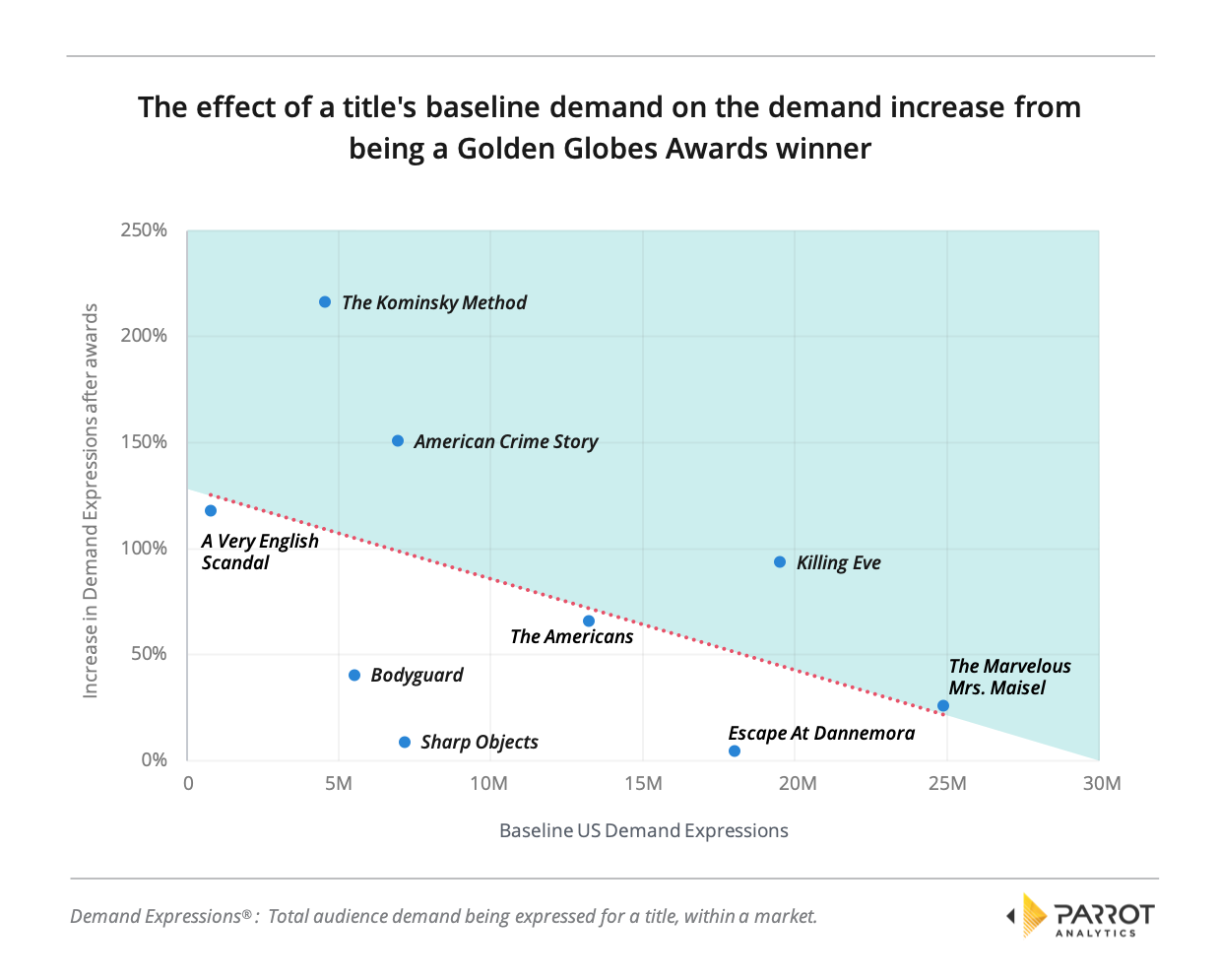Image: Killing Eve, BBC America
On the 6th of January 2019, television and film stars attended the 76th Golden Globes awards in Hollywood. As we did for the 74th and 75th Golden Globes awards, we have once again analyzed the impact of the ceremony on each winning title’s US audience demand.
The US demand footprint of Golden Globe winning shows
By plotting the US demand for the Golden Globes-winning titles over time around the date of the ceremony, we can see how viewers reacted to the win of each show:
With a 94% increase from the win and an already high baseline demand, BBC America’s Killing Eve is the Golden Globes winner that had the highest absolute demand after the awards. With a peak of nearly 40 million Demand Expressions in the US, Killing Eve was the 14th most in-demand of all TV titles in the United States immediately after the ceremony. These are impressive numbers considering Killing Eve‘s first season concluded in May 2018.
The two other series with high baseline demand are Amazon’s The Marvelous Mrs. Maisel, season two of which was released on 5th December and Showtime’s Escape At Dannemora, a recent series which has concluded its US broadcast only on 30th December 2018.
The fact that both shows aired recently and thus had high baseline demand, may explain why each of these had some of the lowest demand increases of any of the winners. We will now investigate further which shows benefited the most from their win in the next section.
Which shows benefited most from winning a Golden Globe?
In total, nine television series won in at least one category at this year’s Golden Globes awards. To determine the effect of winning on the US demand for these shows, we first measured the ”baseline” demand for each show, being the average demand for each show over the two weeks prior to the ceremony.
By comparing this baseline demand to the demand peak for each show that immediately followed the ceremony, we can see which title gained most demand immediately following their win.
By using this approach, the show that gained the biggest increase in Demand Expressions (DEx) was Netflix’s The Kominsky Method, which after the results were announced, gained 216% in demand compared to its baseline demand. The second biggest increase from the award win was for FX’s American Crime Story: The Assassination of Gianni Versace, which gained 151% additional daily average DEx.
Interestingly, this means that the shows that benefited most from winning were also the only shows to win multiple Golden Globes: Both American Crime Story and The Kominsky Method won two awards each – every other show only won one award.
This result follows on from what we observed last year. For the 2018 ceremony, HBO’s Big Little Lies won four Golden Globes awards (the most of the 2018 winners) and was also the show with the highest demand increase, based on the same analysis approach as we have used in this article.
As mentioned in the previous section, Escape At Dannemora had the lowest increase with only a 4% gain, but this is likely because the show has only finished airing around a week earlier (and was thus already enjoying a high baseline level of demand).
Do lesser well-known shows benefit more from winning a Golden Globe?
Continuing our analysis from the previous Golden Globes, we now compare the baseline demand to the demand increase for each of the winning titles to see what the relationship between the two can tell us.
For this year’s Golden Globes awards, the correlation between the two measures is -0.49, slightly stronger than last year’s result of -0.41.
Combining the results of the previous three Golden Globes awards (the 74th, 75th and 76th), we now have a correlation of -0.27 across a sample size of 21 titles, though this is still a small sample size even across three years of data.
Our correlation analysis reveals that the higher the baseline demand a title had before winning, the less of a boost in demand it gets from winning. This result makes intuitive sense, as a lesser known title has more room to grow its fanbase on the back of the publicity from a big win than an already huge title can.
For the 2019 shows this can be best observed for The Kominsky Method, which compared to the other winning titles was a relatively unknown sitcom before winning Best Comedy – and immediately gaining 216% more demand.
Parrot Analytics would like to extend our congratulations to the cast and crew for nominated and winning titles at the Globes this year. The ceremony was once again packed with superb shows in every single category: We would have had a hard time picking our winners!
The first data-driven Global TV Demand Awards
What if we could rely on global consumer data from hundreds of millions of viewers and fans to determine the winners? Please visit our Global TV Demand Awards website to find out which title deserves to be called the most in-demand TV series in the world.




